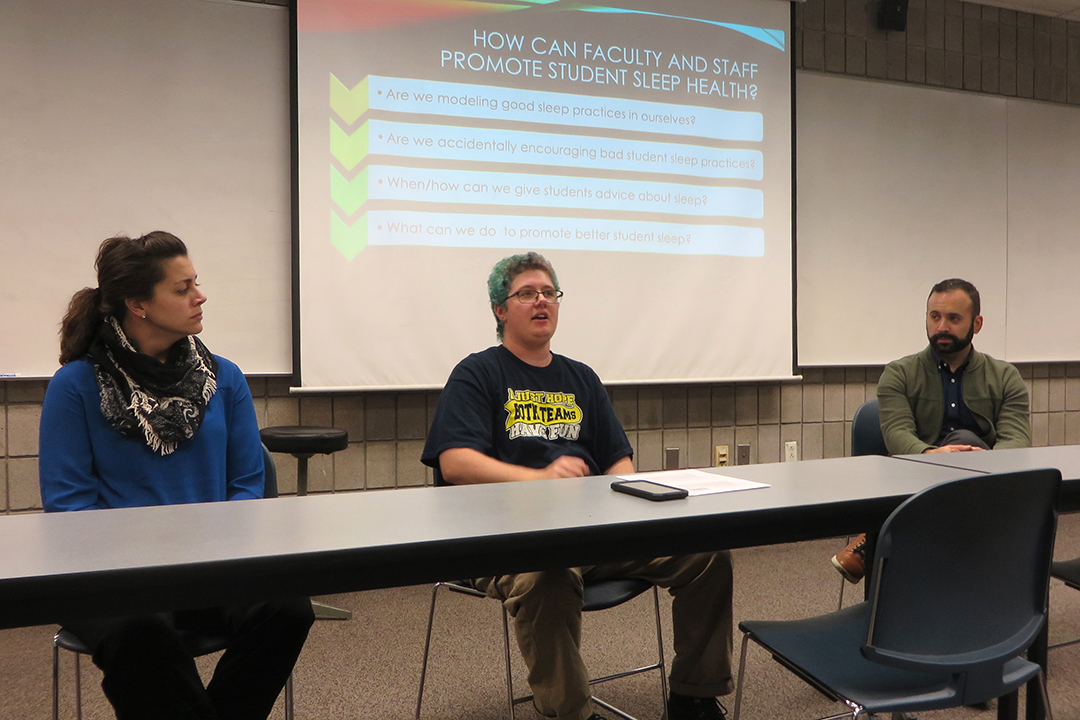Student Support Services: Mental Health and Wellness
Inclusive Excellence Initiative Event
RIT Panelists: (l to r) Sara Engel, Alan Smerbeck, Jaime Castillo
Barriers to proper and healthy sleep affects many students during their college residency. To bring light to this particular area of student mental health, the Inclusive Excellence Initiative at the College of Science invited faculty, staff and students to participate in an open panel discussion.
Professor Alan Smerbeck (associate professor of psychology) kicked off the session with an overview about sleep hygiene, common misunderstandings and persistent habitual patterns working against healthy sleep. His presentation addressed cognitive, psychological and physiological problems resulting from lack of or interrupted sleep.
Smerbeck reported on the consequences of interrupted or insufficient sleep. Impairments are seen in working memory, reasoning, creativity, decision making, and a collection of mental planning and self-control skills known as “executive function”.
Psychologically, sleep deficits affect concentration, mood, anxiety and tension, anger, sensitivity to stress, ability to experience pleasant emotions, social functioning and impulsivity.
There are also physiological effects when sleep is restricted or fragmented. Metabolism is less efficient, blood pressure increases, and cortisol–a stress hormone–is present at higher levels.
After the overview, Smerbeck joined two other RIT panelists, Sara Engel (health promotion specialist) and Jaime Castillo (mental health therapist). All three professionals are proficient in multiple areas of student health. They addressed sleep deprivation, restriction and fragmentation—their causes and solutions.
Castillo shared pointers for developing a schedule for work and sleep. By knowing what has to be done during certain parts of the day, the overall larger picture of the work load will diminish and stress tends to lessen. Students will be less likely to ruminate about the load if a specific time and schedule is mapped out. He suggested jotting down on post-it notes those “to-do” lists before bed that would otherwise keep a student awake at night. By knowing they have a planned time to do them they can relax and get a good night’s sleep.
Engel pointed out that it is always helpful for students to identify where they tend to procrastinate so they can attempt to avoid it in the future and eliminate buildup of work load.
During an open question and answer session panelists discussed helpful do’s and don’ts to assure a healthy sleep routine for students. Many of the points are helpful for everyone, not just students.
Do. . .
- set sleep time schedules (if you want to be asleep by 11, set your schedule moving backwards from there and stick to it). The brain wants you to wake and sleep at the same time each day.
- use sleep masks and/or ear plugs in bright, noisy dorm rooms.
- try progressive muscle relaxation (tense muscles and then relax them) to help release anxiety.
- review course syllabus on onset, to avoid last minute all-nighters to complete something you didn’t see coming. Understand the progress of the course and where you might procrastinate.
- prioritize your work for the next day or two. Know what you will work on in the morning and afternoon but don’t look at the huge amounts of work ahead of you. Take it day by day planning what needs to be done.
- use post-it notes to help you organize what you need to accomplish that is keeping you up at night. Jot down what you’ll do when and then put them aside while you get a good night’s sleep.
Don’t. . .
- normalize and celebrate bad sleep habits by thinking getting no sleep is being a hard worker.
- watch television or videos while doing homework and studying.
- take part in conversations or texting while studying–use good time management.
- use devices with backlit screens (computer, laptop, phone) before or after your bedtime. These devices give off light frequencies that signal the brain to stay awake.
- assume caffeine will make you alert; it may just bring you up to baseline more than make you extra-focused.
- use alcohol, as it relaxes you temporarily and disrupts your sleep later.
The session ended with small group discussions on how faculty and staff can help students regulate their sleep habits. Modeling good sleep behavior and bringing awareness to the above guidelines may help students see the importance of healthy sleep patterns. It was also noted for first year students, many have never had to regulate their sleep patterns and this may be the first time they have had to time manage a heavy coursework schedule. It is important for students to know faculty and staff recognize their barriers and support them in working through them together.
For additional resource materials on sleep, visit The National Sleep Foundation https://www.sleepfoundation.org/.
For more information on Inclusive Excellence and upcoming events, visit: http://InclusiveExcellence.rit.edu










